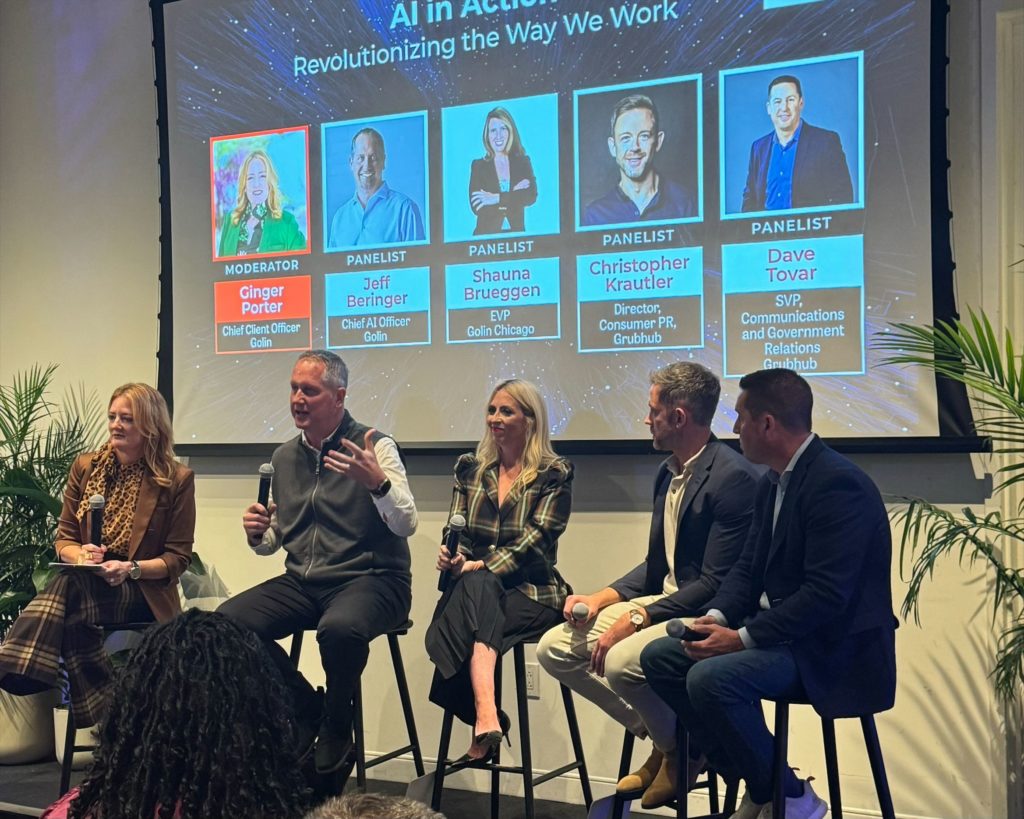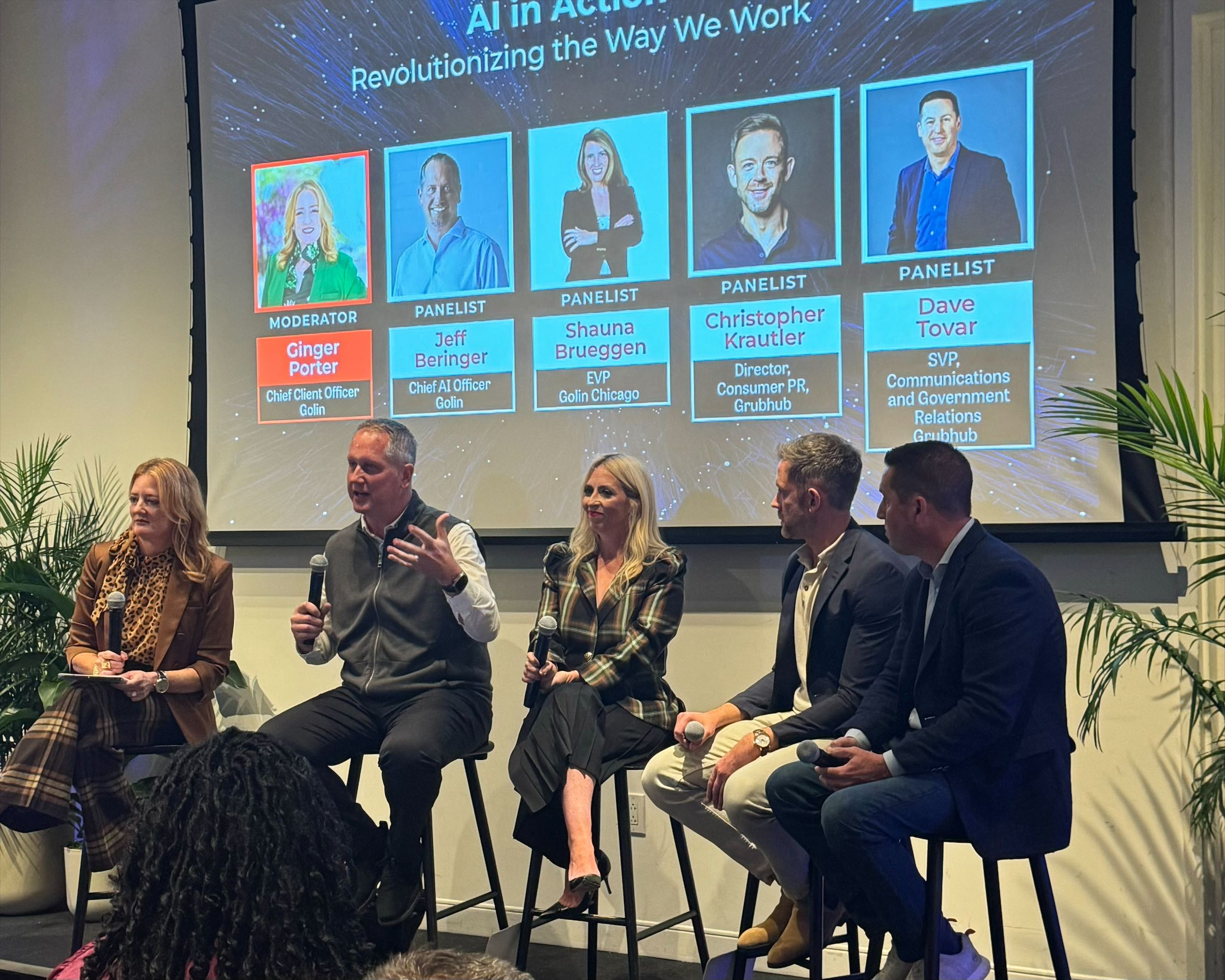By Jeff Beringer, Chief AI Officer
As Golin’s Chief AI Officer, I’m working with our teams and clients to integrate artificial intelligence across the spectrum of public relations work we do every day. Recently, we had the opportunity to put AI to the test – not in a simulation with a made-up brief – but in a real-world brand campaign for our client Grubhub. The result was not just a blockbuster earned-led program, but a treasure trove of insights about the practical application of AI in PR. What works. What doesn’t (yet). And how to put AI to work safely and swiftly, now.
Read on for a few learnings from our “Special Delivery” campaign experiment.
The Challenge: Transforming Talk into Action
The 2024 State of Marketing AI Report reveals a stark reality: only 36% of marketers are integrating AI into their daily workflows this year, with just 19% having AI roadmaps. At Golin, we’re collaborating with clients to move beyond talking about AI and start doing. Our partners at Grubhub recognized AI’s potential to enhance the work we do together and optimize results. Together, we identified a perfect opportunity to explore AI’s potential in PR: the planning and execution of a high-profile brand campaign slated for the summer.
The Experiment: Special Delivery
The “Special Delivery” campaign targeted expectant mothers with a promise that resonated deeply: delivering their most-craved meals right after giving birth. This emotionally charged initiative allowed us to implement AI across the entire spectrum of PR work, from initial research to final measurement.
Our experiment covered five crucial areas of PR work, each presenting unique challenges and opportunities for AI integration.
1. Research and Insights
AI proved invaluable in analyzing massive volumes of consumer survey data, spotting patterns and drawing conclusions faster than traditional methods. However, it wasn’t without hiccups. In one instance, AI mistakenly referenced a competitor instead of Grubhub in its analysis. This taught us a crucial lesson: the importance of trying multiple AI tools and refining our prompts to achieve optimal results.
2. Creative and Content Production
In the realm of content creation, AI became our silent partner. It assisted in enhancing user-generated content, creating custom pitch assets, and even generating a teaser video with AI-visualized storks. One of our most exciting discoveries was the efficacy of AI-powered Emotiv Content Testing.
3. Media Relations
AI transformed our approach to media outreach. It helped us personalize our pitches by creating custom visuals for top-tier media targets. During the Olympics, which coincided with our campaign, AI proved particularly useful. It assisted in analyzing real-time journalist coverage interests and optimizing local market outreach timing based on the performance of hometown athletes participating in the Games, allowing us to cut through the noise of a busy news cycle.
4. Influencer Selection
Our influencer selection process got a significant boost from AI. We implemented an AI-powered process created by Golin called FitCHECK, which streamlined influencer vetting by analyzing potential issues across platforms going back ten years. This depth of analysis would have been impractical, if not impossible, using traditional methods. The time saved allowed us to focus more on building relationships with influencers and guiding content creation.
5. Measurement and Reporting
In the final stage of our campaign, AI helped us go beyond surface-level metrics. We employed AI for sentiment analysis and impact prediction. And we used Golin’s AI powered tool, BrandEQ, to measure the emotional intelligence of the conversation beyond basic positive, neutral, or negative sentiments. This AI technology aims to identify the emotions that either attract consumers to a brand or drive them away. This gave us a nuanced understanding of how our campaign resonated with the audience. With a campaign score of 256 (when scores above 100 are considered strong), it evoked positive emotions like desire, trust, and delight, drawing consumers toward the brand.
Key Learnings
Our experiment yielded several crucial insights that will shape our approach to AI integration in PR moving forward.
First and foremost, we discovered that the winning formula isn’t AI alone, nor is it traditional methods alone. The magic happens when you combine the two. AI is incredibly powerful—even in today’s early forms— but it needs human guidance and oversight to truly shine. This synergy between human creativity and AI capability became the cornerstone of our success.
We also found that the time savings provided by AI in certain tasks led to better results. By assisting or automating rote work, AI freed up to 50% of our time in for certain tasks, allowing us to reinvest that time in higher-impact activities like storytelling, personalization, more surgical pitching, talent management and relationship-building. This shift to focus more human time and energy from mundane tasks to strategic thinking elevated the quality of our work across the board.
Perhaps most excitingly, we discovered that AI unlocks new possibilities in PR. From testing subconscious reactions to creative content to deep diving into influencer histories to ensure brand safety, AI allowed us to do things that were previously impossible or impractical. AI expanded our toolkit and opened new avenues for human creativity and strategy.
Our journey of AI integration with this significant Grubhub campaign wasn’t without its challenges. There were failures along the way but embracing a growth mindset helped us adapt and find solutions. When one AI tool failed, we didn’t give up on AI altogether. Instead, we tried alternate tools and approaches, often seeing significant improvements.
Finally, we learned that implementing AI is as much about cultural transformation as it is about technology. Building a team of “pilots” versus “passengers” and fostering a culture of continuous learning was crucial to our success. This mindset shift was perhaps our most valuable takeaway, setting the stage for ongoing innovation and growth.
AI + Humans = Amazing Results
The campaign’s success exceeded our expectations, both in terms of brand impact and team growth.
From a brand perspective, we saw a 54% increase in brand loyalty among those exposed to our AI-assisted work. Our social media posts outperformed typical engagement rates by 20%, and the campaign website attracted a record number of visits, with moms revisiting 4-5 times on average. We achieved 100% standalone coverage in top media outlets, a rarity in today’s cluttered media landscape.
But perhaps most impressively, the campaign is projected to deliver $228 million in lifetime value for Grubhub. This figure alone underscores the benefits of AI integration and the potential of talented people and AI working together to deliver results.
The impact on our team was equally significant. We went from 1 in 3 team members having much hands-on AI experience to 100% reporting confidence and ability to use AI in their work post-campaign. This rapid upskilling served the team well in the context of this campaign, and it ensures they’re ready to tackle future challenges with confidence.
Looking Ahead
As Dave Tovar, SVP of Communications at Grubhub, aptly put it, “I see this very similar to the advent of social media. We all can laugh now and look back and say, ‘Of course we needed to incorporate it,’ but none of us got there overnight.”
This experiment was just the beginning. The key to moving forward is to make AI part of our everyday business, not just a one-off experiment. At Golin, we’re committed to becoming the first fully AI-integrated global PR agency, and experiments like this are paving the way for our teams and our clients to make AI a natural part of how all our work gets done in the future.
Remember, the goal isn’t to replace human creativity and strategic thinking with AI, but to enhance our capabilities and free up time for what truly matters: building relationships, crafting compelling narratives, and driving impactful results for our clients.
As we continue this journey, one thing is clear: the future of PR is not either human or AI – it’s human and AI working together to achieve unprecedented results. And if our “Special Delivery” campaign is any indication, that future is bright indeed.

